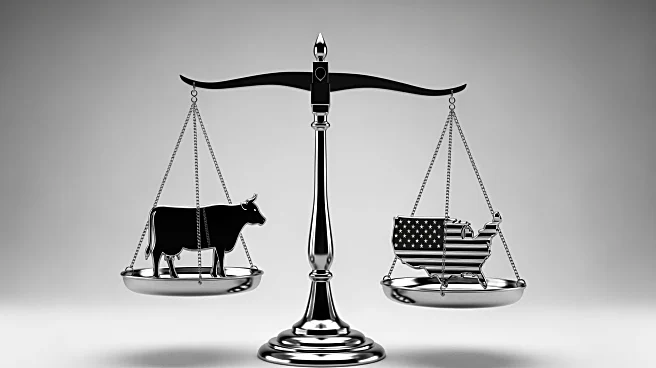What's Happening?
President Trump has proposed importing beef from Argentina as a measure to reduce high beef prices in the United States. This announcement was made during a flight from Florida to Washington, D.C. The
proposal has sparked significant reactions from various agricultural organizations and industry stakeholders. The U.S. Cattlemen’s Association and the National Cattleman’s Beef Association have expressed concerns, arguing that increased imports could harm domestic producers and disrupt the market. The American Farm Bureau Federation highlighted the economic challenges faced by U.S. farmers, emphasizing the need for policies that support domestic production. The proposal comes amid ongoing discussions about antitrust enforcement and price transparency in the beef supply chain, with the Department of Justice and USDA reportedly working on a joint initiative.
Why It's Important?
The proposal to import beef from Argentina has significant implications for U.S. agriculture and food security. Domestic cattle producers fear that increased imports could lead to lower prices for U.S. beef, negatively impacting their livelihoods. The move could benefit foreign suppliers and multinational packers, potentially undermining the U.S. cattle industry. Additionally, concerns about Argentina's history of foot-and-mouth disease raise questions about the safety and health implications of importing beef. The proposal also highlights broader issues of trade imbalances and the need for transparent and fair market practices. Stakeholders are urging the administration to prioritize domestic production and support policies that strengthen the U.S. agricultural sector.
What's Next?
The proposal is likely to lead to further discussions and negotiations among industry stakeholders, policymakers, and government agencies. The USDA and Department of Justice may release statements clarifying the administration's plans and addressing concerns raised by agricultural organizations. There may be increased lobbying efforts from farm groups to influence policy decisions and protect domestic producers. The administration will need to consider the economic and health implications of importing beef and work towards solutions that balance consumer needs with the interests of U.S. farmers. The outcome of these discussions could shape future trade policies and impact the U.S. beef market.










